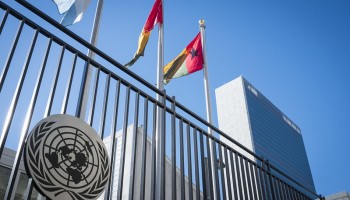The talks should start in 2022 and if successful, could result in the most significant policy the body has adopted since the establishment of the U.N. Convention against Transnational Organized Crime (UNTOC) in 2000.
As people’s lives have increasingly moved online, cybercrime have become lucrative for both new and established criminal enterprises. The pandemic, which forced millions to work from home and interact with others almost entirely online, only accelerated that trend.
Unlike other crimes, cybercrime is not constrained by physical space, it rarely happens within a single country, let alone a single municipal jurisdiction. Until now, the United Nations has had no treaty with which to establish a process that deals with cross border cybercrime, or even a shared definition of what constitutes a cybercrime.
“In January 2022, governments will begin a process to expand a global cybercrime instrument at the U.N. – the first to tackle this pervasive and complex phenomenon,” said GI-TOC’s report on the negotiations. “While there is a near universal belief that something should be done to increase global cooperation and create a shared understanding of the issues, this process is hampered by a deep mistrust among member states.”
The process has been strongly opposed by many Western nations including the U.S. and U.K. while paradoxically, the measure was first proposed by Russia, a major hub for cybercriminals targeting other countries.
However, the reason many other countries have opposed Russia's draft proposals, are fears that the legislation could be too broad and endanger free speech and political activists.
“Russia’s draft treaty submitted for consideration in the upcoming negotiations includes provisions on child pornography, racial or ethnicity-based incitement and crimes against humanity,” said GI-TOC. “However, it further includes incitement to suicide (article 16) and a loosely defined article on ‘offences related to the involvement of minors in the commission of unlawful acts that endanger their life or health’.”
The Russian proposal then calls for signatories to transcribe certain crimes into their own laws, including one calling for the criminalization of the digital spread of materials calling for ideologically based crimes - something others have called a “Pandora’s Box” for human rights abuses.
Ultimately there are a few potential routes GI-TOC believes the U.N. will take.
A Russian-backed proposal will win out, based on the already extant Budapest Convention on Cybercrime, an alternative, which still uses the Budapest Convention as base but removes some of the more dangerous Russian proposals, or the discussions will continue to stall without resolution.
“Taken together, the arguments and process so far have revealed significant political, ideological and substantive obstacles to the creation of a new treaty on cybercrime,” the report acknowledged.
“Geopolitics does not lend itself to building trust in these times of declining multilateralism, with the cybersphere as a key battleground,” it explained. “The lack of transparency that surrounds current responses to high-level cybercrime attacks begs the question of whether states want a convention that draws their actions into the light.”






